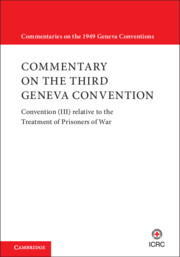 Commentary on the Third Geneva Convention
Commentary on the Third Geneva Convention Book contents
- Commentary on the Third Geneva Convention
- International Committee of the Red Cross
- Copyright page
- Contents
- Foreword by Peter Maurer
- Acknowledgements
- Abbreviations
- Introduction
- Preamble
- Part I General Provisions
- Part II General Protection of Prisoners of War
- Part III Captivity
- Part IV Termination of Captivity
- Part V Information Bureaux and Relief Societies for Prisoners of War
- Part VI Execution of the Convention
- Section I General provisions
- Section II Final provisions
- Article 133 Languages
- Article 134 Relation to the 1929 Convention
- Article 135 Relation to the 1899 or 1907 Hague Conventions
- Article 136 Signature
- Article 137 Ratification
- Article 138 Coming into Force
- Article 139 Accession
- Article 140 Notification of Accessions
- Article 141 Immediate Effect
- Article 142 Denunciation
- Article 143 Registration with the United Nations
- Testimonium and signature clause
- Book part
- Sources
- Index
- References
Article 133 - Languages
from Section II - Final provisions
Published online by Cambridge University Press: 21 August 2021
- Commentary on the Third Geneva Convention
- International Committee of the Red Cross
- Copyright page
- Contents
- Foreword by Peter Maurer
- Acknowledgements
- Abbreviations
- Introduction
- Preamble
- Part I General Provisions
- Part II General Protection of Prisoners of War
- Part III Captivity
- Part IV Termination of Captivity
- Part V Information Bureaux and Relief Societies for Prisoners of War
- Part VI Execution of the Convention
- Section I General provisions
- Section II Final provisions
- Article 133 Languages
- Article 134 Relation to the 1929 Convention
- Article 135 Relation to the 1899 or 1907 Hague Conventions
- Article 136 Signature
- Article 137 Ratification
- Article 138 Coming into Force
- Article 139 Accession
- Article 140 Notification of Accessions
- Article 141 Immediate Effect
- Article 142 Denunciation
- Article 143 Registration with the United Nations
- Testimonium and signature clause
- Book part
- Sources
- Index
- References
Summary
Until the early twentieth century, most multilateral treaties were writtenin only one or two languages. The 1929 Geneva Conventions, for example, wereconcluded only in French, which was still the leading diplomatic language atthat time.
- Type
- Chapter
- Information
- Commentary on the Third Geneva ConventionConvention (III) relative to the Treatment of Prisoners of War, pp. 1945 - 1950Publisher: Cambridge University PressPrint publication year: 2021
